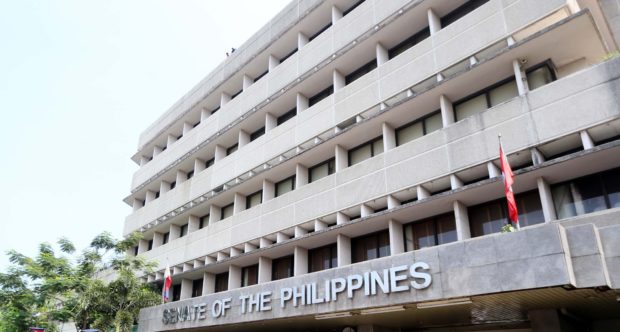
The Senate building at the GSIS Complex in Pasay City. (Photo by LYN RILLON / Philippine Daily Inquirer)
MANILA, Philippines — The Senate ratified on Monday the reconciled version of the 2023 national budget amounting to P5.268 trillion.
The Congress’ Bicameral Conference Committee approved on Monday morning the consolidated version of the proposed 2023 budget, containing the reconciled versions from the Senate and House of Representatives.
Senator Sonny Angara, chairperson of the Senate Committee on Finance, presented the reconciled version of the proposed budget during the plenary session.
Angara told his fellow senators that agriculture and food security enjoy a wide range of support.
“Mananatili ang makabuluhang pondo para sa sektor ng agrikultura sa ilalim ng Department of Agriculture (DA) at ng mga attached agencies nito, sa Philippine Crop Insurance Corporation, at sa Department of Agrarian Reform,” he said.
(The significant fund for the agriculture sector under the Department of Agriculture and its attached agencies, the Philippine Crop Insurance Corporation, and the Department of Agrarian Reform will remain.)
Likewise, according to Angara, cash assistance will continue next year, such as the Pantawid Pamilyang Pilipino Program.
An additional budget was also allocated to the Department of Social Welfare and Development’s Assistance to Individuals in Crisis Situations and Sustainable Livelihood Program and the Department of Labor and Employment’s emergency employment programs.
Fuel subsidies for owners and operators of public utility vehicles (PUV), taxis, tricycles, and ride-hailing services were increased from P2.5 billion under the National Expenditure Program to P3 billion.
The P1-billion financial subsidy for the Fuel Assistance Program for Farmers and Fisherfolk under the DA was also retained.
Moreover, the bicameral panel decided to increase the social pension for senior citizens to P25.3 billion programmed and P25 billion unprogrammed funds.
In compliance with the Constitution, lawmakers prioritized the education sector with a budget of P900.9 billion from P884.6 billion under the 2023 General Appropriations Bill.
“Dahil dito, patuloy ang iba’t ibang financial assistance, scholarship at subsidiya ng gobyerno para sa edukasyon,” Angara said.
(Pursuant to the Constitution, the various financial assistance, scholarships, and government subsidies for education will continue.)
The Department of Education’s (DepEd) budget was also hiked to repair and rehabilitate facilities ravaged by calamities such as typhoons and earthquakes. Budgets for state universities and colleges were likewise given additional funding.
Meanwhile, the bicameral panel gave more allotment for Public Health Emergency Benefits and Allowances for healthcare and non-healthcare workers.
To make healthcare affordable, P100.2 billion was allocated for the National Health Insurance Program under the Philippine Health Insurance Corporation.
Lawmakers allocated a fund for COVID-19 vaccine purchase and hiring immunization vaccinators, regional hospitals, health centers, and other Department of Health programs.
Moreover, Angara said that the Department of Public Works and Highways would get a “significant” across-the-board increase for various programs and projects. It will also get more funds for constructing, repairing, and rehabilitating airports and seaports in the archipelago.
Improving the transportation sector, including implementing the PUV Service Contracting or free ride program, was also promised.
On the other hand, the budget of the Energy Regulatory Commission will be augmented to P453.112 million to support its operations and capital outlay.
“This is done in a bid to strengthen the commission’s capacity to ensure the competitiveness of our energy sector and regulate the energy market such that end-consumers fulfill their energy needs at the most affordable costs possible,” Angara said.
More support for the programs and projects of the Department of Trade and Industry may also be expected next year, said Angara.
Ways to enhance the internet and to make the government more effective through the use of technology will also continue such as the National Broadband Plan and Free Internet Access Program of the Department of Information and Communications Technology.
The bicameral committee also agreed to provide more support for the revival of Philippine tourism.
Additional funding will also be received by the Department of Human Settlements and Urban Development, Angara said, while the Department of Environment and Natural Resources will get more allotment for its National Land Titling Program.
Allocation was also inserted in the local government support fund for programs and projects that could help local governments after their meager national tax allotment collection in 2020 due to the COVID-19 pandemic.
The Senate minority bloc, composed of Minority Leader Aquilino “Koko” Pimentel III and Senator Risa Hontiveros voted “no” during the ratification.
Pimentel scrutinized the bicameral conference’s reconciled version of the GAB through interpellation.
Hontiveros, meanwhile, lamented that the 19th Congress “missed an opportunity to show its independence.”
“We failed to demonstrate that we do hold the power of the purse… Tila naging mapurol at pudpud ang proteksyong binigay sa pondo ng bayan by granting in full all the requests for confidential and intelligence fund under the Marcos-Duterte administration,” she explained.
(It seems that the protection we have given the country’s money became blunt by granting in full all the requests for confidential and intelligence funds under the Marcos-Duterte administration.)
“And worst, the legislature agreed to remove provisions that require congressional reporting of the utilization plan and disbursement of the confidential and intelligence fund,” she added.
Earlier, Hontiveros successfully moved to realign P120 million of DepEd’s P150-million confidential and intelligence funds (CIFs) into its maintenance and other operating expenses.
However, the bicameral conference panel reinstated the DepEd’s CIFs, citing the need to protect children from scrupulous groups.
Aside from DepEd, the original P10-billion budget of the National Task Force to End Local Communist Armed Conflict, which was reduced, has been restored despite its low project accomplishment rate.